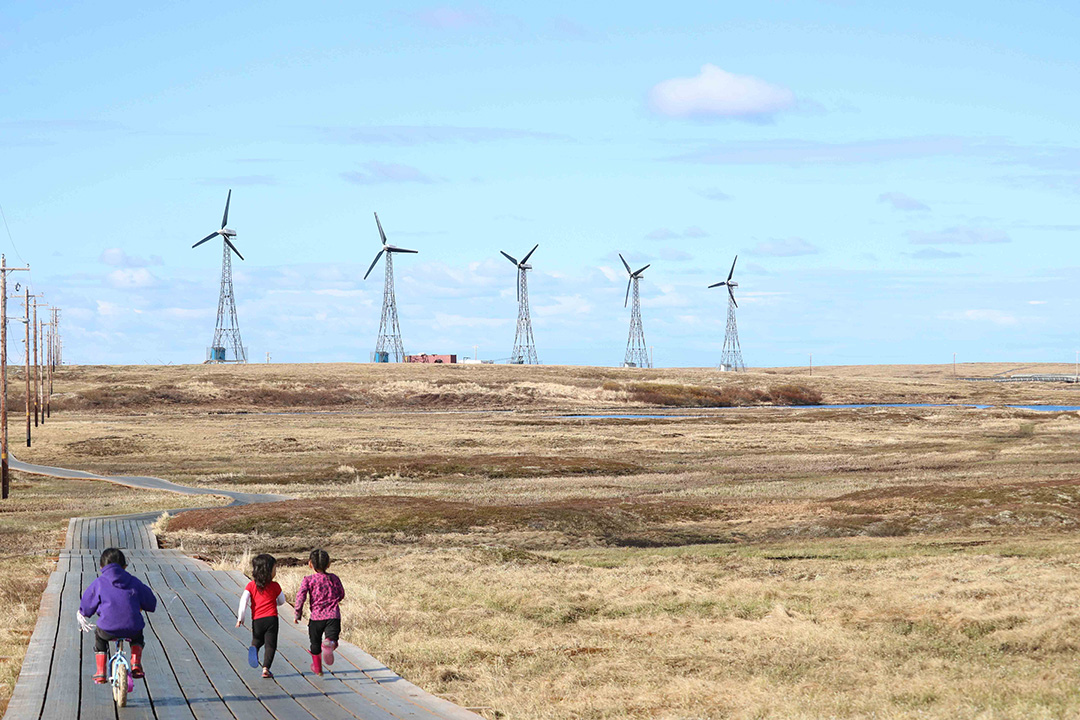
USask project supports northern energy security
Imagine living in a remote community that is dependent on diesel generators or on an electrical grid that’s highly vulnerable to harsh winter storms. Or spending more than half your income to heat your home. That is the reality in more than 250 northern and Indigenous communities in Canada today.
By Jackie MartinNow imagine if these communities were not only energy sufficient, but able to leverage energy to generate social and economic opportunity. Energy security is more than infrastructure and technology, it is also about communities.
Dr. Greg Poelzer (PhD) of the School of Environment and Sustainability (SENS) and Dr. Bram Noble (PhD) of the Department of Geography and Planning (GEPL) at the University of Saskatchewan (USask) are leading an exciting and ground-breaking initiative to explore how northern communities can achieve energy independence and benefit economically and socially by developing renewable energy.
“The transition to renewable energy in the North shouldn’t be based on outside solutions,” said Noble. “Renewable energy must be community appropriate, reflecting northern and Indigenous values and interests for the future of their communities.”
The Community Appropriate Sustainable Energy Security (CASES) Partnership, hosted by USask, is jointly led by an international team of researchers from Canada, United States, Sweden, and Norway. It is an $8.8 million international partnership project supported in part by funding from the Social Sciences and Humanities Research Council of Canada and public and private sector partners.
The partnership engages 15 northern and Indigenous communities, each at different stages of renewables deployment. It facilitates the sharing of experience so that not all communities have to go through the same challenges or recreate solutions, thereby accelerating renewable energy innovation.
“Reliable, sustainable, and renewable energy will be key to our economic, social, and cultural well-being,” said Deputy Grand Chief Jordan Peterson of the Gwich’in Tribal Council. “We believe the outcomes of this partnership will help us in our goals to preserve our lands, develop reliable energy supplies, and help us to protect our way of life.”
Working with northern and Indigenous communities, the partnership is co-developing and applying tools to assess and enhance the social and economic value of renewables; identifying the conditions for successfully developing renewables; facilitating co-learning between sister communities; and creating a northern circumpolar knowledge-sharing platform for energy transition tool-kits, and sharing stories from international experience to facilitate long-term capacity building.
“Working with our partners to co-develop tools for community-appropriate energy planning, and establishing a network of sister communities across the North for knowledge sharing, will facilitate energy transition and local capacity building long beyond the life of this project,” said Poelzer.
The project will train the next generation of researchers, policy makers, practitioners and innovators to transform energy systems and reshape energy security in the North. For Rhys McMaster, a current graduate student working on the project, CASES offers a chance for her to contribute her unique perspective as a First Nations woman from the Siksika Nation in Alberta.
“You can’t simply say it’s windy, so turbines are the best solution,” said McMaster. “Some of the technology requires extensive socio-technical skills in order to develop, operate and maintain renewable energy systems at the community level. Therefore, I’m studying the specific socio-technological baseline capacities of the four Gwich’in communities in the Northwest Territories. What they may require for their respective energy transitions may look different than another community, even if those communities share similar geographical or other traits.”
During the first phase of the CASES Partnership project, researchers are working to assess existing community energy systems as a baseline for the project and develop community energy profiles as a planning resource for communities and utilities. Energy profiles will help communities chart their own energy future and inform the sociotechnical design of energy systems that enhance values and reduce vulnerabilities to energy insecurity.
“Peter Ballantyne Cree Nation faces significant energy security challenges that requires transformative research, co-designed with and by Indigenous communities, and training opportunities for the next generation of Indigenous change agents to lead the energy transition in northern communities,” said CASES co-investigator and Indigenous business leader Gary Merasty. “We are excited to be full partners in CASES, which is designed to meet this critical and urgent objectives."
To help meet these training objectives, SENS plans to launch a new master’s program this fall—offered by distance delivery—with a stream focusing on community energy planning and renewable energy in northern and Indigenous communities.
Article re-posted on .
View original article.

